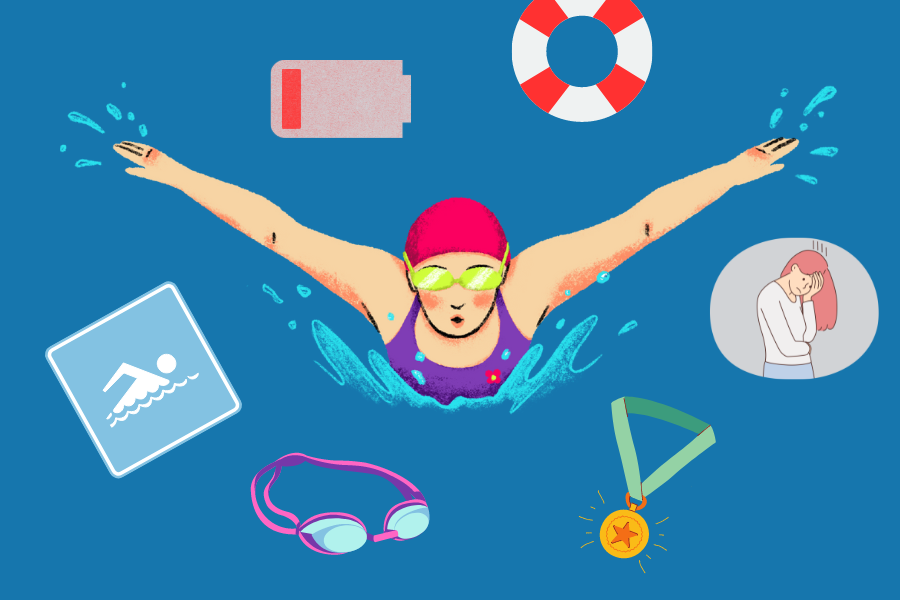When the summer sun beats down on a hot June afternoon, one thing always comes to mind: the pool. I started swimming nine years ago, hoping to expand my horizons and stray from more popular sports like tennis or soccer. My neighborhood swim team presented the perfect answer, and it was hard not to be drawn to the tight-knit group of young swimmers.
My first summer was unforgettable; I was narrowly qualifying for the “A” meets every week, making new friends and dropping time from my personal bests. I idolized the older swimmers who dominated the competition, so when the end of the summer rolled around, I opted to try out for club swimming.
The club swim scene was a change of pace, different from the club soccer teams I had previously played on. Unlike most sports, it was individualized, yet there was still a sense of team. What was once just a hobby turned into a newfound obsession: I loved every minute of practice, every meet, every workout and yoga session. I sacrificed my social life for faster times, and my grit was paying off. I was shamelessly greedy, always wanting more records, blue ribbons and trophies.
When COVID hit, swimming came to an abrupt stop. With no pools open, I didn’t know what to do with myself, so I cross-trained. While biking and running kept my fitness up, nothing compared to the feeling of blazing through the water.
My first practice in July 2020 proved less than ideal, and I was frustrated by how slow I felt. That practice ended with my first-ever panic attack. How was I supposed to be good now, more importantly swim in college? I was only 12, but it seemed like the end of the world. If I wasn’t good at swimming, what was I?
Still, I chose to continue. By the end of the summer, I was back on track, and I began swimming at a higher level the following season. Practice four days a week quickly turned into six, including early morning and afternoon gym workouts. However, as the intensity of my training changed, so did my feelings surrounding the sport.
Swimming is very black and white: your times are your times. Every race’s results are published, good or bad, and it was easy to get caught up in comparisons with my teammates and myself. Various swimming websites could graph my progress, comparing my times to those of previous seasons. The numbers on the screen could only prove my biggest fear. I was getting worse. I turned into a nervous wreck at meets, barely speaking or eating. Before my races, my fear of failure would fill my goggles with pools of tears.
My nerves and fear of failure weighed me down, and I had become the slowest swimmer in my group. I loved my teammates and coach, but I quickly dreaded practices. Body aches and exhaustion slowly extinguished my drive to win. Swimming felt like an unbreakable cycle between panicking about practice, feeling anxious in the water and attempting to brace myself for a hard workout.
Going into high school, I rallied and tried out for the swim team. I started swimming new events during my freshman year, and long-distance freestyle became my new niche. My spark returned; I loved going to practice again, and I was achieving every goal I had created for myself, taking more time than I could have ever imagined.
When sophomore year came along, my objective was to get even better. However, my lofty hopes were challenged in early November when I noticed my times were slipping.
I fell into a self-induced trap, and I vowed never to skip a practice from then on, overcome with a crippling sense of guilt anytime I even fathomed taking a break. The lively and positive facade I kept up at practice concealed the fact that my love for the sport was fading.
My priorities began to shift that November, and I started showing interest in other things, namely writing and journalism. When I landed a dream internship with a D.C. public news-talk station, the opportunity presented a dilemma: do I skip practice to intern, or do I keep swimming despite beginning to hate it? I decided to do both, sacrificing my well-being in the process.
The thought of entering the pool paralyzed me with fear, but I put my head down and kept swimming. I knew I was physically capable of dropping time, but I wasn’t mentally able to. I hated my brain, I hated my anxiety, I hated that I was making myself helpless. And then, everything I had worked for seemed to implode in just a few seconds.
After falling down the stairs and shattering my knee in the Spring of sophomore year, I had no choice but to take time off. I didn’t feel owned by swimming anymore. Taking a break showed me what my life could be like.
So after nine years, I quit club swimming entirely. I appreciate everything the sport gave me, but it sacrificed my time for family, friends and, most importantly, myself.
I still love swimming, but I know it’s time to move on. I’m ready to discover parts of myself that I didn’t even know existed, free from an overwhelming sense of guilt. I’m glad I burned out of my sport, and I’m excited for the opportunities that await me outside the pool.












Cate N. • Feb 24, 2024 at 10:00 pm
Great work, Sonia. As someone who made a similar decision, I’m so proud of you and your bravery. Putting yourself first at this age is complicated and messy and imperfect, but the other side is well-worth it! I’m excited to see what’s next for you.